The world of e-commerce has been dominated by two major players for years: Amazon and eBay. Both platforms offer unique opportunities for sellers, but how do they stack up against each other? In this article, we will delve into the key differences between selling on Amazon vs eBay, covering aspects such as fees, ease of use, customer base, and more.
Amazon VS eBay
| Comparison Aspect | Amazon | eBay |
| Fees | Referral fee of 6%-45% and a $39.99 monthly fee for professional sellers. | Final value fee of 10%-12.35%, capped at $750. |
| Customer Base | Over 300 million active users. | Approximately 182 million active users. |
| Setting Up a Seller Account | Requires more information and verification. | Less rigorous verification process. |
| Pros | Larger customer base and Fulfillment by Amazon program. | More flexibility in listing and pricing items. |
| Cons | High competition and fees. | Smaller customer base and potential high final value fees. |
Fees for Selling on Amazon vs eBay
There are a number of factors to consider when deciding between Amazon and eBay as a platform for selling. While both platforms offer a wide range of products for sale, there are some key differences in terms of fees and payment processing.
One of the biggest differences between Amazon and eBay is the fee structure. Amazon charges a referral fee, which ranges from 6% to 45% depending on the category of the product. In addition to this fee, Amazon also charges a monthly subscription fee for professional sellers, which is $39.99. On the other hand, eBay charges a final value fee, which typically ranges from 10% to 12.35%, with a maximum cap of $750.
It is important for potential sellers to carefully consider the fees associated with each platform and determine which one will be the most cost-effective for their specific business needs. For example, if you have a product with a high price point and a large profit margin, the referral fee on Amazon may be worth it in order to tap into the platform’s massive customer base. However, if you have a low-priced item with a smaller profit margin, eBay may be a better option due to its lower fees.
Another factor to consider is the payment processing system. Both Amazon and eBay offer various payment options, including credit card payments, PayPal, and Amazon Pay. However, eBay has a slightly different system, which may be beneficial for some sellers. For example, eBay offers a buy-it-now feature, which allows buyers to purchase an item immediately at a fixed price, without having to go through the auction process. This can be particularly useful for items that have a lower value or that are in high demand.
Ultimately, the decision between Amazon and eBay will depend on your specific business needs and goals. It is important to do your research and carefully consider the fees and payment processing systems before making a decision.
Customer Base: Amazon vs eBay
When it comes to customer base, Amazon has a significant advantage over eBay.
According to recent data, Amazon has over 300 million active users, which is more than eBay’s user base of approximately 182 million. This large customer base gives Amazon a competitive edge in terms of visibility and sales of products. Amazon’s customer base is also more diverse and loyal, with customers spending more money per transaction on average.
However, eBay still has a strong presence in certain markets, particularly in the collectibles and antique niche. eBay also offers a more casual shopping experience, which appeals to certain types of customers who are looking for unique or vintage items. Additionally, eBay’s seller community is vast and active, with many small businesses and independent sellers selling their products on the platform.
Overall, while Amazon has a larger customer base and a more diverse customer base, eBay still has a loyal following and unique advantages in certain market segments. It’s important for businesses to consider both platforms when reaching customers and optimizing their online sales strategy.
Ease of Setting Up a Seller Account
Both Amazon and eBay have relatively straightforward processes for setting up a seller account. However, Amazon’s process requires more information and verification to ensure a high level of trust and quality among its sellers.
To set up an Amazon seller account, you will need to provide your business name, contact information, and tax identification number. You will also need to provide information about your products, including product details, prices, and images. Amazon will then verify your information and, if everything checks out, your account will be active.
Setting up an eBay seller account is similar to setting up an Amazon account. You will need to provide your business name, contact information, and tax identification number. You will also need to provide information about your products, including product details, prices, and images. eBay will then verify your information and, if everything checks out, your account will be active.
Overall, both platforms have relatively straightforward processes for setting up a seller account, but Amazon’s process requires more information and verification to ensure a high level of trust and quality among its sellers.
Pros and Cons of Selling on Amazon vs eBay
Certainly, here are some additional pros and cons to consider for selling on Amazon versus eBay:
Amazon pros:
- A larger customer base: Amazon has a vast network of customers, making it a popular choice for selling products online.
- Opportunity to be part of the Fulfillment by Amazon program: This program allows sellers to use Amazon’s warehouses and shipping facilities to fulfill orders, making it easier and more efficient to sell on the platform.
- Higher sales volume: Amazon’s popularity and search engine algorithm make it a highly sought-after platform for buyers, leading to a higher volume of sales.
- Better visibility: Amazon’s search algorithm and sponsored listings can increase the visibility of your product listings, making it easier for customers to find and purchase your products.
Amazon cons:
- Higher fees: The fees for selling on Amazon are generally higher than those on eBay, making it more expensive to sell on the platform.
- More competitive: The competition for selling products on Amazon is fierce, with many other sellers vying for the same customers and market share.
- Limited control over the selling process: As an Amazon seller, you have limited control over the selling process, including pricing and inventory management.
eBay pros:
- More flexibility in listing and pricing: eBay allows sellers to have more control over their product listings, including the ability to choose specific categories and keywords. Additionally, sellers can set their own prices and handle shipping and returns.
- A smaller customer base: eBay’s customer base is smaller than Amazon’s, which means that competition is generally lower.
- Lower fees: The fees for selling on eBay are generally lower than those on Amazon, making it a more cost-effective option for some sellers.
eBay cons:
- Less visibility: eBay’s search algorithm is not as strong as Amazon’s, which can make it more difficult for your product listings to be discovered by customers.
- More competitive: Despite having a smaller customer base, eBay can still be a highly competitive platform, with many other sellers vying for the same customers and market share.
- Higher final value fees: eBay charges sellers a final value fee for each sale, which can add up quickly and impact your overall profitability.
What’s More – For E-commerce business, consumer insights are also very important
VOICE OF CUSTOMER lets consumers tell you what they need, what they expect, and why they buy. Multi-channel integration + AI intelligent insights + scientific business models, from data to action in a single step, using the voice of consumers to guide business decisions. consumer voice to guide business decisions. VOC can help you solve the following problems to improve product quality and drive brand growth.
- A variety of feedback channels: Various feedback channels such as Amazon/ebay, social media, email/chat, etc.
- Insufficient number of manual spot checks, resulting in wrong conclusions: Wrong insights, resulting in serious wrong business decisions
- Time lag of insights conclusion: Organizational manpower spends a lot of time reviewing partial feedback, not able to identify problems in time
- Inability to identify new opportunities in a timely manner: New opportunities are a few voices hidden in a large amount of feedback, which is difficult to find manually
- Inability to develop quantifiable action points: Problems can’t be optimized if they can’t be measured
- Which aspect of the competitor’s product do consumers like and why? Everyone knows this product sells well, but few people know why?
- In which aspect does the competitor surpass my brand and why? In which aspect of installation/use scenario/quality/packaging/logistics, the reputation is better than mine
- Which attribute of the competitor has the best reputation and why? Which factor impresses consumers the most, capacity, color, material?
- What are the reasons for my consumer churn? What consumers dislike most about the products/services I provide
The Best E-commerce ChatGPT Tool — Shulex
Shulex is a global business data insights company and an AI-powered applications company. We capture multimodal consumer voices from across the web and leverage GPT AI’s powerful analytics to provide our global clients with intelligent, scientific, and efficient consumer insights. We also provide a free Amazon ChatGPT browser extension, a custom VOC consumer insights platform, an Amazon category analysis report, and a one-stop e-commerce customer experience workbench. From AI data analysis to AI business application, we provide a full range of services to effectively help global sellers achieve business strategic planning, product planning and solutions, e-commerce operation optimization, and customer experience improvement.
If you want to experience the power of AI,try our free tools at Shulex ChatGPT for Amazon
How to Shulex ChatGPT for Amazon?
Step 1: Install ChatGPT Tool for Amazon
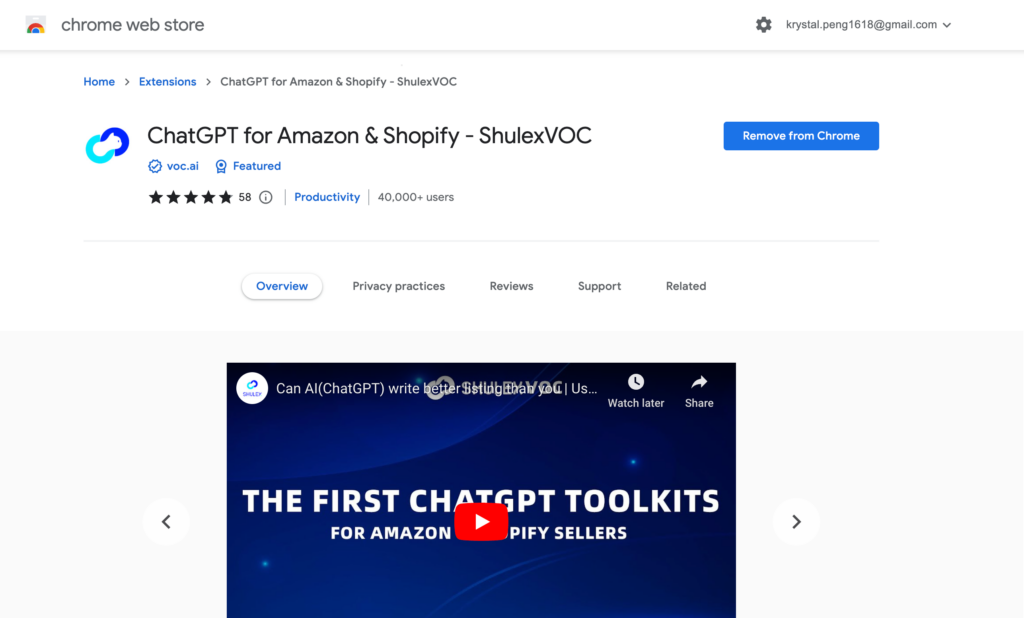
Step 2: Open Amazon and Use ChatGPT Tool for Amazon
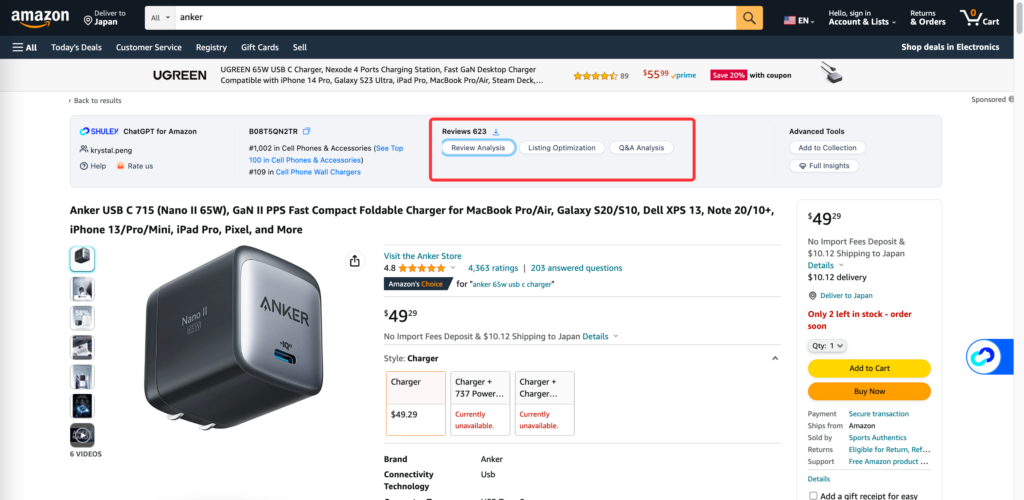
Step 3: Product and Consumer Research
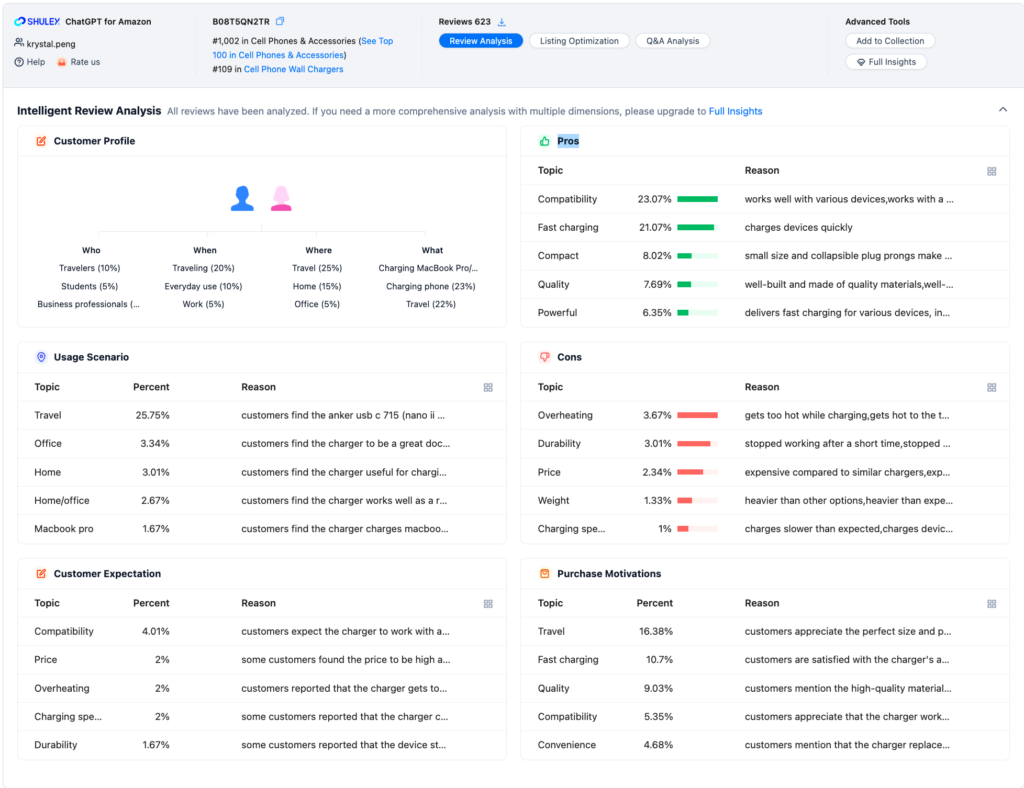
Step 4: Amazon listing Optimization
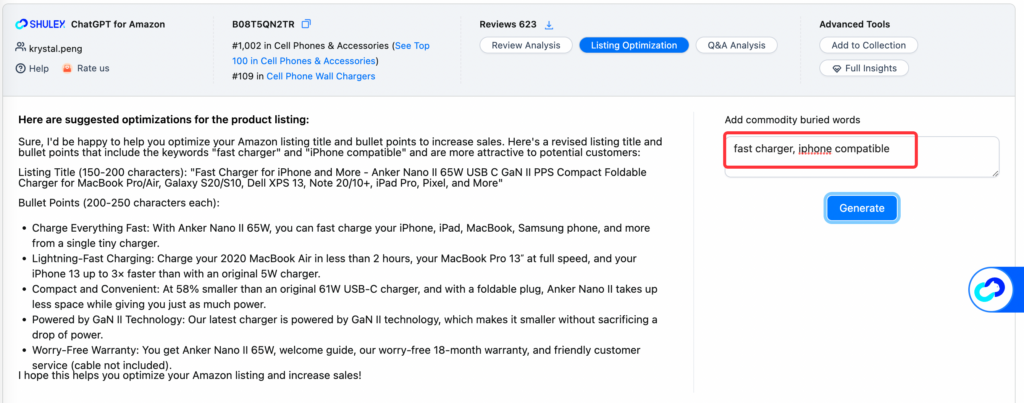
Step 5: Enjoy full version of ChatGPT Tool for Amazon
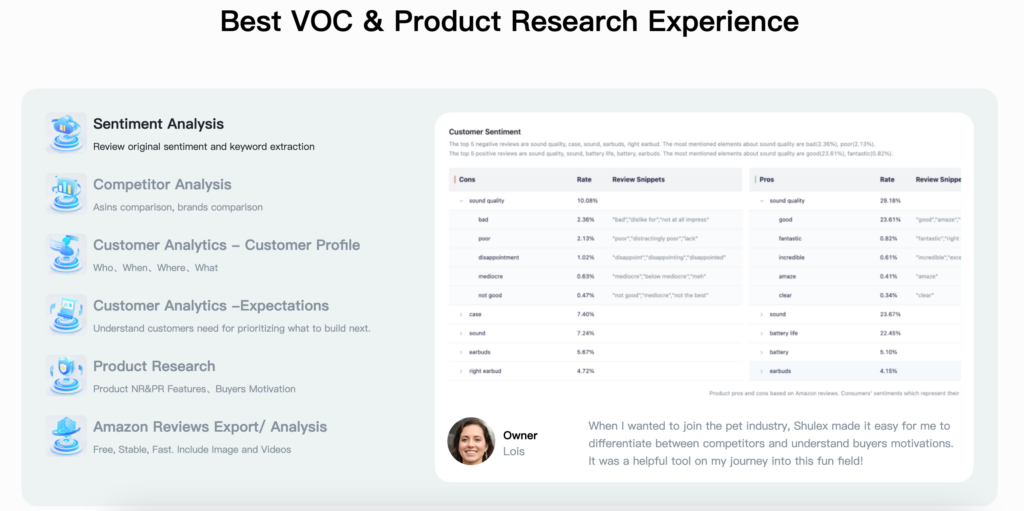
Free Try: Shulex ChatGPT tool for Amazon
FAQs
- Which platform has a larger customer base?
Amazon has a larger customer base with over 300 million active users, while eBay has approximately 182 million.
- Is it easier to set up a seller account on Amazon or eBay?
Setting up a seller account on both platforms is relatively straightforward. However, Amazon’s process is slightly more rigorous, requiring more information and verification than eBay.
- Can I sell the same products on both platforms?
Yes, you can sell the same products on both platforms. This strategy can maximize your visibility and reach a broader audience. However, it’s essential to consider the different fees, rules, and customer expectations on each platform.
- What the best tool for Amazon sellers?
The best tool for Amazon sellers is Shulex AI tool, it uses GPT (Generative Pre-trained Transformer) technology to analyze a block of text. It then identifies the most frequently used words and generates a word cloud accordingly. This process is highly efficient and can be completed in just a matter of seconds.
